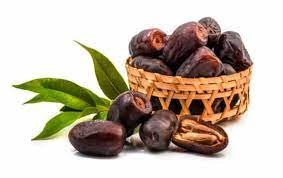
Dates are a sweet and nutritious fruit that have been a staple in Middle Eastern cuisine for centuries. In recent years, dates have become increasingly popular around the world due to their unique flavor, versatility in cooking, and numerous health benefits. One of the most important aspects of dates is their calorie content, which is essential for those who are watching their weight or trying to maintain a healthy diet. In this article, we will explore the nutritional value of dates, their health benefits, and the role that calories play in incorporating them into a healthy, balanced diet.
1. Introduction: Understanding the Importance of Calorie Counting in Dates
What are Dates?
Dates are a sweet and chewy fruit that are often eaten as a snack or used as an ingredient in baked goods. They come from the date palm tree and are commonly grown in hot and dry climates, particularly in the Middle East and North Africa.
Why Calories Matter?
Calories are units of energy that come from the food we consume. Keeping track of calorie intake is important for maintaining a healthy weight and ensuring adequate energy levels for daily activities. Dates, like all fruits, contain calories, and it's important to understand the calorie content of the foods we eat to ensure we're meeting our nutritional needs.
2. Nutritional Value of Dates: Calories and Other Essential Nutrients
Calorie Breakdown in Dates

Dates are a high-calorie food, with one Medjool date containing approximately 66 calories. However, they are also a good source of fiber and other essential nutrients, making them a healthy addition to your diet in moderation.
Other Nutrients Found in Dates
In addition to their calorie content, dates are a good source of nutrients like potassium, magnesium, and vitamin B6. They are also rich in antioxidants, which can help protect against cell damage and reduce the risk of chronic diseases.
3. Health Benefits of Dates: Boosting Immunity and Promoting Digestive Health
Antioxidant Properties of Dates
The antioxidants found in dates can help protect against cell damage and inflammation, both of which can contribute to the development of chronic diseases like cancer and heart disease.
Benefits to Digestive Health
Dates are also a good source of fiber, which can help promote digestive health by preventing constipation and promoting regular bowel movements. The high fiber content of dates may also help reduce the risk of colon cancer.
Other Health Benefits of Dates
Dates have been shown to have a number of other health benefits, including improving brain function, reducing inflammation, and boosting immune function.
4. Incorporating Dates in Your Diet: Tips for Healthy and Delicious Meals
Ways to Incorporate Dates in Your Diet
There are many ways to incorporate dates into your diet, including eating them as a snack, adding them to smoothies, or using them as a natural sweetener in recipes.
Recipes for Delicious and Healthy Meals with Dates
Here are a few recipes to help you incorporate dates into your diet in a healthy and delicious way:
1. Date and Nut Energy Bars: Mix dates, nuts, and other healthy ingredients like chia seeds and oats to create a nutritious and portable snack.
2. Date and Almond Butter Smoothie: Blend dates, almond butter, almond milk, and ice to create a delicious and healthy smoothie.
3. Stuffed Dates: Cut open dates and stuff them with nuts, cheese, or other healthy ingredients for a sweet and savory snack.
Incorporating dates into your diet can provide a variety of health benefits and add a delicious sweetness to your meals.
5. How Many Calories are in Dates? Recommended Daily Intake and Serving Sizes
Calories in Different Types of Dates
Dates come in various types, and the calorie content of each type differs slightly. For example, Medjool dates are more calorie-dense than Deglet Noor dates. Here’s a breakdown of the calorie content in 100grams of different types of dates:
- Medjool Dates: 277 calories
- Deglet Noor Dates: 282 calories
- Khadrawi Dates: 281 calories
- Zahidi Dates: 282 calories
Recommended Daily Intake of Dates
While dates are high in nutrients and have many health benefits, it’s important to consume them in moderation. The American Heart Association (AHA) recommends limiting added sugar intake to 6 teaspoons (25 grams) for women and 9 teaspoons (38 grams) for men. Dates are high in natural sugars, so it’s best to limit your consumption accordingly.
Understanding Serving Sizes of Dates
A serving size of dates is about three Medjool dates or four Deglet Noor dates. It’s important to stick to the recommended serving sizes and not exceed them as it can lead to a higher calorie intake.
6. Date Syrup: A Healthier Alternative to Refined Sugar
What is Date Syrup?
Date syrup is a sweetener made from pureed dates. It’s an excellent alternative to refined sugar as it contains no added sugars or chemicals. Date syrup is a popular sweetener in Middle Eastern cuisine and is now widely available in health food stores and online.
Why Choose Date Syrup over Refined Sugar?
Date syrup is a healthier alternative to refined sugar as it contains natural sugars along with health-promoting nutrients like fiber, potassium, and magnesium. Unlike refined sugar, date syrup doesn’t cause a sudden spike in blood sugar levels, making it a great option for people with diabetes. Using date syrup instead of refined sugar can also reduce the risk of obesity, heart disease, and other chronic illnesses.
7. Conclusion: The Role of Dates in a Balanced and Nutritious Diet
Summary of Key Points
Dates are high in fiber, vitamins, and minerals, making them a nutritious addition to any diet. They are also a great source of natural energy and can provide a quick boost of energy when needed. However, due to their high sugar content, it’s important to consume dates in moderation.
Final Thoughts on Dates and Nutrition
Overall, dates are an excellent food choice for anyone looking to maintain a balanced and nutritious diet. They can be consumed as a snack or used as an ingredient in many recipes. When choosing dates, consider the calorie content and stick to the recommended serving sizes to avoid overconsumption. And for those looking for a healthier alternative to refined sugar, date syrup is an excellent option.In conclusion, dates are a great addition to any diet due to their nutritional value, versatility in cooking, and numerous health benefits. Whether you are looking to boost your immune system, improve your digestion, or simply add a sweet and delicious treat to your meals, dates are an excellent choice. By understanding the calorie content of dates and incorporating them into your diet in moderation, you can enjoy all the benefits of this tasty and nutritious fruit while maintaining a healthy lifestyle.
When choosing dates, consider the calorie content and stick to the recommended serving sizes to avoid overconsumption. And for those looking for a healthier alternative to refined sugar, date syrup is an excellent option.In conclusion, dates are a great addition to any diet due to their nutritional value, versatility in cooking, and numerous health benefits. Whether you are looking to boost your immune system, improve your digestion, or simply add a sweet and delicious treat to your meals, dates are an excellent choice. By understanding the calorie content of dates and incorporating them into your diet in moderation, you can enjoy all the benefits of this tasty and nutritious fruit while maintaining a healthy lifestyle.
FAQ
1. Are dates high in calories?
Yes, dates are relatively high in calories compared to other fruits. However, they are also high in essential vitamins, minerals and fiber.
2. How many calories are in a single date?
The calorie count in a single date varies based on the size and type of date. On average, one Medjool date contains around 66 calories.
3. Can I eat dates if I am trying to lose weight?
Yes, you can eat dates while trying to lose weight, but it is important to do so in moderation. Incorporating dates into a healthy and balanced diet can provide essential vitamins and minerals while satisfying your sweet tooth.
4. What are some creative ways to incorporate dates into my diet?
Dates are incredibly versatile and can be used in a variety of dishes, including salads, smoothies, and baked goods. You can also stuff them with nuts or cheese for a delicious and healthy snack.
- Log in to post comments